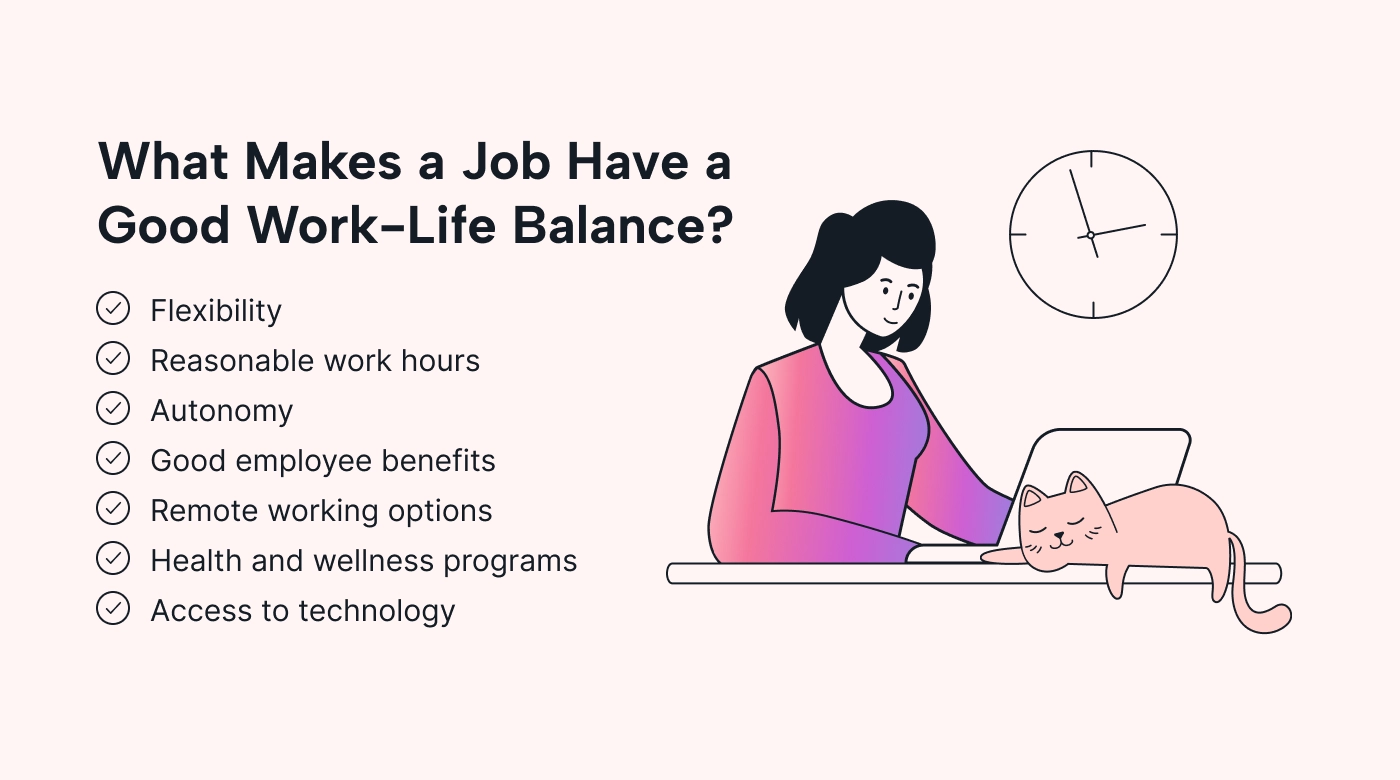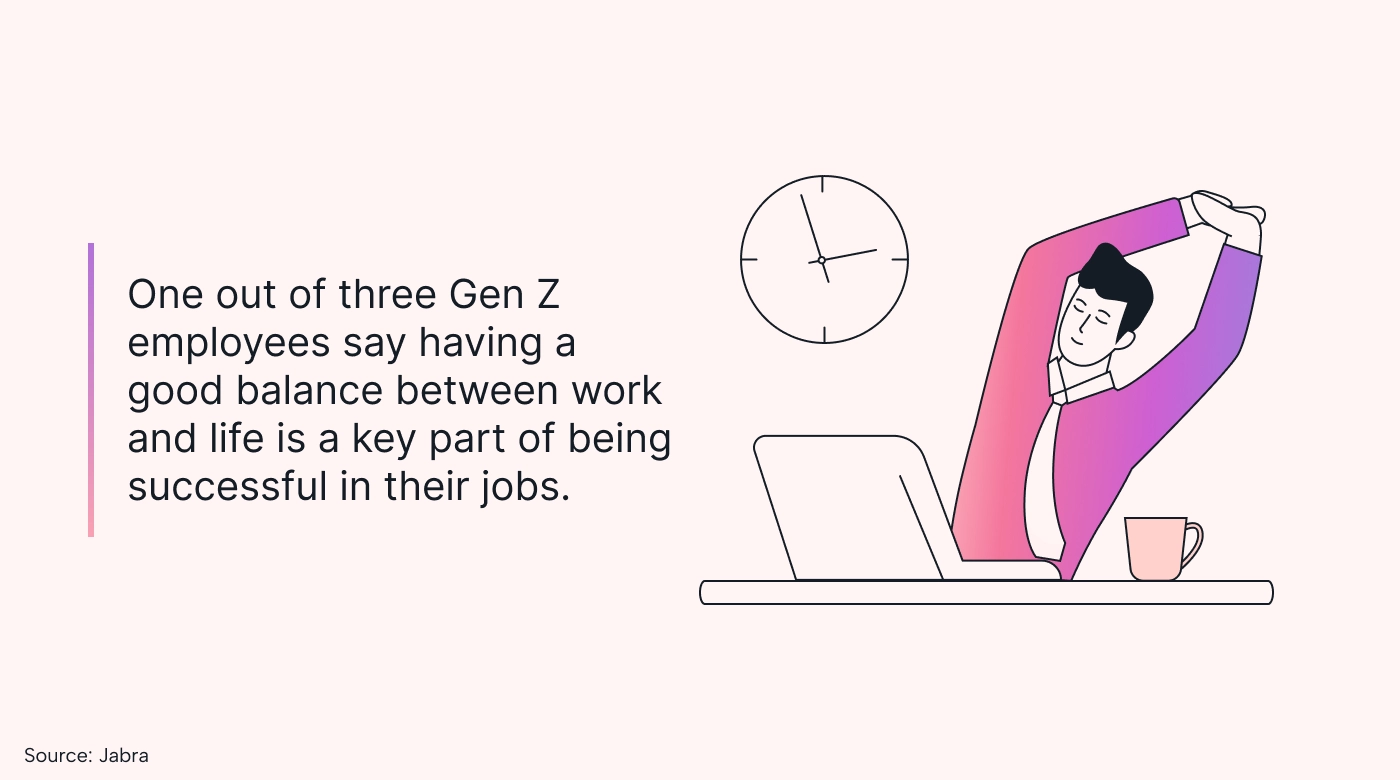A staggering 77% of employees have experienced burnout at their jobs, with consequences ranging from stress and depression to heart disease.
It's no wonder, then, that more working professionals are reevaluating what really matters to them.
Half of the world’s workers are more interested in achieving a balanced lifestyle than climbing the corporate ladder. Employers are catching on to this trend and advertising work-life balance in their job postings as a result.
But which jobs really offer a good work-life balance?
If you’re looking for a career change that’s less demanding and more flexible, read our list of the best work-life balance jobs.
12 best work-life balance jobs
The following 12 careers offer the best blend of work satisfaction and personal well-being. We’ll look at how each of these roles fosters a balanced lifestyle through flexible scheduling, autonomy, and, of course, financial reward.
Note: The average salary for each occupation is taken from Talent.com.
1. Dentist
Dentists often have the flexibility to set their own schedules, especially if they own their practice. This autonomy allows them to balance patient appointments with personal time, making it easier to manage their workload and stress.
Like other roles in the medical field, dentistry has a high earning potential and job security.
Average salary: $160,323 per year
2. Psychologist
Psychologists can work in many different settings, such as private practices, schools, and hospitals. This gives them a lot of flexibility in terms of scheduling.

These professionals can often set their own hours or choose part-time work, giving them a healthy balance between their work and personal lives. Their role as mental health specialists also means they have a deep understanding of stress management techniques and the importance of a good work-life balance.
Average salary: $97,492 per year
3. Marketing professional
Marketing roles can vary significantly, from SEO specialist to content creator. However, many of them share opportunities for creativity, remote work, and flexible scheduling.
With the rise of digital marketing, professionals in this field can work from virtually anywhere, giving them more control over their work environment and hours. According to Balance the Grind, 88% of marketing professionals can work remotely or have flexible hours.
Average salary: $67,677 per year (but this can vary a lot based on the role and the person’s experience)
4. Teacher
Most teachers have a structured schedule with the added benefit of school holidays and summers off. These long periods give them a well-deserved break.
A predictable yearly schedule can mean more time for personal interests and family time outside of the school year.

Average salary: $42,942 per year (depending on location and level of education)
5. Research engineer
Research engineers develop and improve products, processes, and technologies. Their roles are applicable to different industries, giving them many options for jobs that suit their needs and lifestyles.
This role often allows for a flexible work environment, including the possibility of remote work and adaptable schedules. For example, a research engineer might spend part of the week in the lab developing new materials, and the rest of the time working from home to analyze data and write reports. With no constraints of a traditional 9-to-5 job, they have more time to spend with their families.
Average salary: $116,353 per year (depending on their specialization)
6. UX designer
UX designers often work in tech, an industry known for valuing flexibility and employee wellness. Their role is well-suited for remote work, which allows them to avoid long commutes and work from environments that better suit their personal and professional needs.
The field of UX design is always evolving, which encourages a culture of continuous learning and development. This can lead to a more stimulating work environment that values growth and education through workshops, conferences, and courses.
UX designers blend creativity and innovation to create user-friendly experiences. This can be fulfilling both personally and professionally.
Average salary: $104,389 per year.
7. Graphic designer
Graphic designers’ work is often project-based, which gives them predictable periods of work to plan around — and more downtime if they'd prefer.

If they work independently, graphic designers can choose how many projects they want to take on and which clients to work with, potentially making their job more engaging and exciting.
Average Salary: $52,665 per year (but freelance rates can vary)
8. Recruiter
Recruiters, especially those who work for themselves or remotely, have a lot of control over their schedules and workload. Once they have their targets set, how they’ll reach their goals and how hard they’ll work is up to them.
Recruiters are also always in demand, too — companies look for new talent and replace existing employees all the time. This job security, combined with remote working possibilities, makes recruiting an attractive, flexible career option.
Average salary: $57,515 per year (with potential for bonuses)
9. Data analyst
Data analyst roles often have flexible working options, including remote work and adjustable hours. This flexibility comes from their ability to conduct data analysis and communicate their findings from virtually anywhere as long as they have internet access.
Data analysts can manage their workloads around personal commitments and preferences rather than being confined to a strict office schedule.
Average salary: $79,993 per year
10. Real estate agent
Real estate agents enjoy a solid work-life balance due to the nature of the job, which blends autonomy with client interactions.

Unlike traditional office roles, real estate agents often have the freedom to set their schedules around property viewings and client meetings. This allows them to manage their work hours in a way that fits their personal life.
These professionals can also do a lot of their work remotely, like responding to property inquiries or updating listings, giving them even more control over their day.
Average salary: $98,996 per year (varies based on commission, sales volume, and location)
11. Sales
Sales jobs are great for balancing work and life because they are performance-based. Their focus is on results, not the number of hours spent at a desk.
Sales executives can often choose when and where they work as long as they meet their targets. Being able to set their schedules means it’s easier to balance their work commitments with their personal lives.
These individuals’ potential for high earnings based on performance can also increase their job satisfaction and financial security.
Average salary: $30,638 per year for sales associates and $87,500 per year for sales managers
12. Chiropractor
Chiropractors, especially those who have their own private practices, have the flexibility to set their schedules to meet the needs of their patients while also having fulfilling personal lives. This control over their work schedule can contribute significantly to a balanced lifestyle.
Average salary: $83,524 per year
What makes a job good for work-life balance?
We should all strive for a good work-life balance in our professions, but what does that kind of job look like? Here are some key elements that make a job conducive to a balanced lifestyle:

Flexibility
A flexible job means having more control over when, where, and how work gets done. This can come in different forms, like flexible working hours, the option to work part-time, or working under a hybrid model. Having more flexibility helps employees accommodate their personal commitments, like family responsibilities or hobbies, without sacrificing their career progress.
Reasonable work hours
The average full-time employee works about 44 hours per week. Forty-one percent work 45 hours or more.
Long work hours can have serious health consequences, such as stress, heart disease, and depression.
Jobs with reasonable work hours help ensure that employees are not consistently working long days that take up their personal time. Sticking to a standard workweek or offering extra time off gives them enough time to recharge and prevents them from feeling overwhelmed at work.
Good employee benefits
Offering benefits like paid time off, health insurance, parental leave, and retirement plans reduces employee stress regarding finances and taking extra time off. It shows that you are invested in your employees’ well-being and that you see each of them as an individual, not just another cog in the wheel.
Remote working options
Being able to work remotely gives employees the chance to choose a work environment that suits their lifestyle. It also means they don’t have to commute, giving them extra time in their day to dedicate to their personal lives.
Health and wellness programs
Offering fitness memberships, mental health support, and wellness seminars shows employees you care about their well-being. These programs support a positive work-life balance by encouraging healthy habits and integrating wellness into your company culture.
The right technology
Tools that help with project management, communication, and automating routine tasks allow employees to work smarter, not harder. By reducing the amount of time they spend on manual work, technology helps employees have more time for their personal lives.
Why is work-life balance so important?
Work-life balance isn’t just a buzzword but a crucial part of modern working life. Here’s why balancing professional responsibilities and personal life is so important:
Increased job satisfaction
Almost one out of every three Gen Z employees say having a good balance between work and life is a key part of their success in their jobs. This generation doesn’t want to sacrifice one for the other and expects to aim high in their careers without giving up other big parts of their lives.
A culture that promotes work-life balance also helps companies attract and retain employees. According to a Microsoft study, the top five aspects of work that employees view as “very important” for an employer to provide are as follows:
- A positive culture (46%)
- Mental health/well-being benefits (42%)
- A sense of purpose/meaning (40%)
- Flexible work hours (38%)
- More than the standard two weeks of paid vacation time each year (36%)

Better mental and physical health
Chronic stress from work and being overworked can lead to burnout, anxiety, depression, and physical health issues like heart disease. A study by the American Psychological Association found that employees without the freedom to balance work and life are much likelier (67%) to report job-related mental health issues. Only 23% of those with flexible work-life management experience similar issues.
Increased productivity
Research has shown that longer hours don’t mean more output, and employees with a work-life balance are more productive than those without. Slack’s Workforce Lab found that people who log off at the end of the workday are 20% more productive than those who feel the pressure to work after hours.
Bring balance to your life with Motion
Balancing your professional and personal life doesn't have to be a juggling act.
Motion is an all-in-one tool for planning your work ambitions and life's pleasures so that you never have to sacrifice one for the other. With its savvy Task Manager and Meeting Assistant, forgetting an important meeting or double-booking your yoga class with a client call are things of the past.
Experience the organizational benefits of signing up for Motion with a risk-free 7-day trial.

Keisha Card is a Senior Project Manager in the digital space who is passionate about knowledge sharing. Let's demystify all things project management and Agile!




